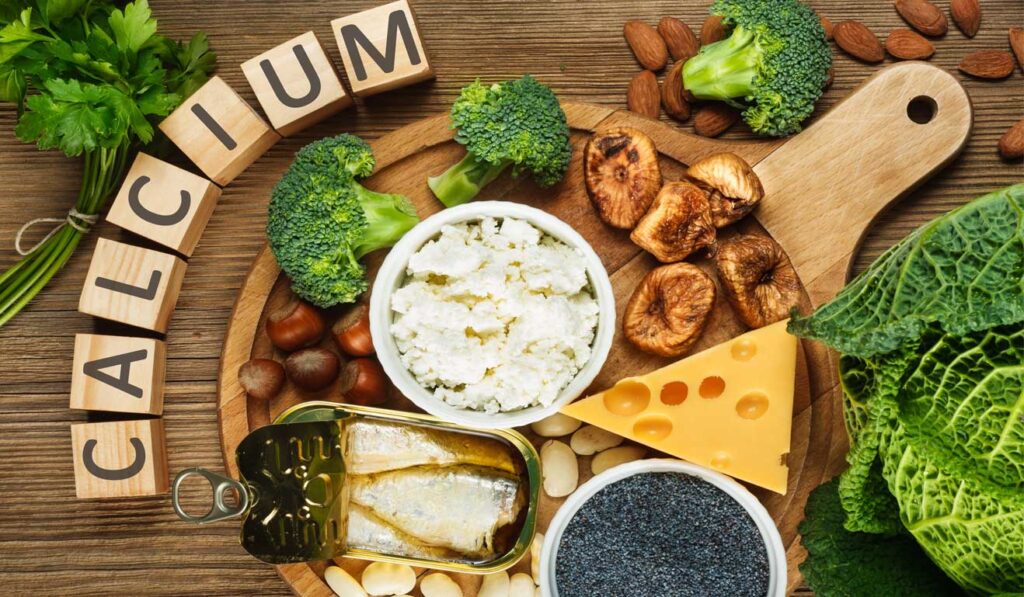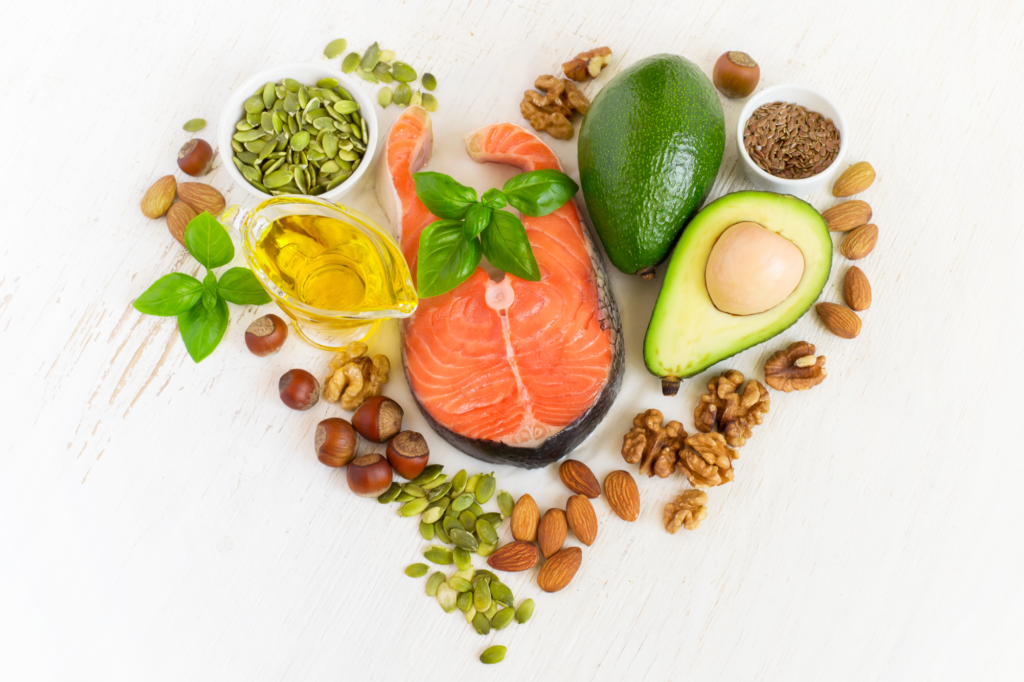Woman Need to Include These 7 Supplements Daily

Every woman knows that HER body needs certain nutrients, vitamins and minerals, to maintain HER health. Of course, you also probably already know that the best source for these vitamins and minerals is by eating whole nutrient-dense foods. But there are some supplements that women need to take for optimal health.
Because according to a study on nutrient intake, 75% of women are not eating the recommended daily amount of fruits. And 80% are not eating enough vegetables. That translates to about 1 in 10 adult women who are actually eating the recommended daily servings of fruits and vegetables to maintain health.
So, what can we do?
Even with a “perfect” diet, it is hard to know if you’re eating the right foods. In addition to that, you need to get precisely enough nutrients to fight symptoms of nutrient deficiency. A review study of clinical trials found that deficiencies of key nutrients may lead to chronic diseases. Also, it concluded that there are certain supplements women need to ward off those diseases.
Being stressed with multiple work deadlines. Sleeping poorly because of a newborn. Or can’t find time to exercise regularly. All these things can hinder your bodies ability to properly absorb the nutrients that you are eating.
Let’s not forget that sometimes we are so busy checking items off our to-do lists. We, then, push our well-intentioned healthy eating habits to the bottom of our priority barrel.
This is where supplementation with either in a multi-vitamin or specific vitamins and minerals can help. Each vitamin and mineral have specific benefits. They are intricately involved in many of bodily functions. Everything from strengthening your immune system to having enough energy throughout your day and maintaining strong bones. Also, there are certain supplements that women need more of than men do.
Additionally, there are certain supplements women need to help keep your gut microbiota healthy and balanced. I discussed this in detail in my post all about the gut microbiota here.
Here is a list of the key supplements every women need to consider taking daily.
7 Key Supplements Women Need Daily
Please consult with your primary health care provider before taking any supplements. Especially if you are taking any prescription medications.
1. Vitamin D
Vitamin D, a.k.a. the ‘sunshine vitamin’ so aptly named because when our skin is under the sun, we naturally produce it. It is a fat-soluble vitamin that regulates over 2,000 genes in our bodies every day.

What it does
- Helps with calcium absorption to promote bone health
- Strengthens the immune system to prevent illnesses
- Reduces inflammation in cells
Why is it important
- Bones can become thin and brittle without it
- Balances blood sugar levels
- Protects against certain cancers, such as colorectal cancer
Food sources of Vitamin D
- Fatty fish like salmon and tuna
- Egg yolks
- Fortified milk, orange juice, and cereal
Recommended daily intake for Vitamin D: The recommended form of vitamin D is vitamin D3 or cholecalciferol. It is the natural form that your body makes from sunlight. The dose range for healthy adult women age 19 to 70 is a minimum of 800 IU daily to an upper limit of 4000 IU daily.
What happens when you are vitamin D deficient?
Nearly 40% of adults in the United States and approximately 70% of Canadians are deficient in vitamin D. Because of this, vitamin D is a supplement women need to be taking.
While you technically can get your daily vitamin D by being in the sunlight for a minimum of 20 minutes, the reality is, most women working 9 to 5, wearing sunscreen to prevent early signs of aging, or living in a wintery climate with little sunlight will not be getting enough time under the sun.
In addition to that, this vitamin is also hard to come by in food, which is all the more reason vitmain D is a supplement women need to take.
2. Magnesium
Magnesium is one mineral that every body needs because it is processes over 300 biochemical reactions in your body. Despite that, 70% of people in developed countries don’t meet their magnesium needs. Magnesium is an essential nutrient. This means this is a supplement women need to get it from food sources or a multivitamin.
What it does
- Protein synthesis; helps create proteins from amino acids
- Maintains genes by creating and repairing DNA and RNA
- Helps with the conversion of food into energy
- Supports your circadian rhythm and helps with sleep
- Regulates normal heart rhythm and blood pressure
- Regulates nerve function and muscle movement
- Maintains bone health
- Balances blood sugar levels
Why is it important
Magnesium is the 4th most abundant mineral in the human body. Every cell in your body needs it to function. That is because magnesium acts as a co-factor or helper molecule in many biochemical reactions in your cells. Therefore, chronically low levels of magnesium can increase your risk of high blood pressure, heart disease, type 2 diabetes, and osteoporosis.
Food sources of Magnesium
- Dark leafy greens, such as kale, spinach, collard greens, mustard greens, and turnip greens
- Avocados
- Bananas
- Dark chocolate
- Nuts, seeds, and legumes
- Whole grains, such as barley, buckwheat, quinoa, and oats
- Fatty fish, such as salmon, mackerel, and halibut
Recommended daily intake for Magnesium:

Different Forms of MagnesiumSupplements
There are different forms of supplemental magnesium and each form have their own uses. The most recommended forms of this supplement women need are:
- Magnesium citrate is the most common type. It is ~90% bioavailable, meaning, your body readily absorbs it. Thus, it is an efficient way to raise magnesium levels. In higher doses, it can also treat constipation and other digestive issues.
- Magnesium oxide is can relieve digestive symptoms, such as heartburn, indigestion, and constipation. It is not as well absorbed (~25% bioavailable) as other forms. Therefore, it is not an efficient compound to raise magnesium levels.
- Magnesium glycinate is ~80% bioavailable. So, it can raise magnesium levels effectively. This form of magnesium may also have calming properties, which may help reduce anxiety, depression, stress, and insomnia.
- Magnesium chloride is ~70% bioavailable. Therefore, it can boost low levels of magnesium. Also, it may relieve muscle soreness when applied topically.
- Magnesium lactate is ~40% bioavailable. It is a littler gentler on your digestive system than other forms. This makes it easier to tolerate if you need to take larger doses of magnesium.
Lastly, it is important to keep in mind that magnesium supplements can interact with certain types of antibiotics and other medications. Therefore, it is important to inform your doctor or pharmacist if you are supplementing with magnesium.
3. Calcium
Over 40 % of adult women in both the United States and Canada are not getting enough calcium in their diet. These statistics put these women at a higher risk for developing osteoporosis.
What it does
- Forms, protects, and maintains bone and teeth strength
- Supports muscle contraction
- Regulates heart rhythm
- Facilitates communication between your brain and every part of your body
Why is it important
The body gets the calcium it needs for basic bodily functions by releasing the calcium stored in our bones and, to a lesser extent, our teeth. Bone rebuilds when there is a calcium surplus in the body either from diet or calcium supplements. However, if you are not getting adequate amount of calcium, your body will continue to draw calcium from your bones. This leaves your teeth and bones weaken, more porous, and brittle.
Therefore, to preserve the health of your teeth and bones, calcium is a supplement women need to include daily. This ensures there is enough calcium in your body to maintain other bodily functions.
Also, supplemental calcium binds to iron, which reduces the amount you absorb. Consider taking calcium and iron supplements at least 4 hours apart for optimal absorption.
Food sources of Calcium
- Dark leafy greens, such as broccoli, kale, collard greens, and bok choy
- Seafood, such as salmon, shrimp, and sardines with bones
- Dairy products, such as milk, yogurt, and cheese
- Nuts and legumes
- Fortified foods, such as orange juice, non-dairy milks, and cereal

How much and which form of calcium to take?
Recommended daily intake: Because women start losing bone density in their twenties, the recommended daily amount of calcium for women between 19 to 50 years of age is 1,000 mg per day. For women 50+ years of age, they should be getting 1,200 mg per day.
As such, if you’re not regularly consuming dairy products, it may be necessary to consider taking a calcium supplement. Similar to magnesium, there are different forms of calcium compounds in calcium supplements. Each compound contains different amounts of elemental calcium, meaning, the actual amount of calcium in the supplement.
- A Calcium carbonate supplement contains 40% elemental calcium. Your body absorbs it well when taken with food.
- Calcium citrate contains 21% elemental calcium. Your body absorbs it well when taken with food.
- Calcium lactate contains 13% elemental calcium and calcium gluconate contains 9% elemental calcium. Both forms are commonly used to fortify foods, such as cereal and fruit juices.
Lastly, like magnesium, it is important to know that calcium supplements can interact with prescription medications, including blood pressure medications, synthetic thyroid hormones, antibiotics, and calcium channel blockers. Therefore, it is important to inform your doctor if you on any prescription medications and supplementing with calcium.
4. Iron
Iron is a nutrient that plays many important roles in your body. Unfortunately, though, approximately one out of three non-pregnant women of reproductive age have iron deficiency anemia. Meaning, they have fewer red blood cells and, as a result, less haemoglobin. This is a protein inside red blood cells that carries oxygen around the body. Low circulating oxygen is what causes your anemia symptoms. Needless to say, iron is a supplement women need to get adequate amounts of.
What it does
- Aids in the production of red blood cells
- Carries oxygen throughout the body
- Facilitates cell growth
- Supports immune function and cognitive development
- Regulates body temperature
Why is it important
Low iron levels may lead to a reduction in red blood cell production, causing anemia. Iron deficiency anemia can result in many unpleasant symptoms, such as excessive fatigue, shortness of breath, poor concentration, and decreased immune function. In addition to that, during your monthly menstrual cycle, the blood loss further depletes your body’s iron stores. Therefore, it is especially important if you have moderate to heavy periods to eat iron-rich foods and/or take supplements during your cycle.
Lastly, entering pregnancy with anemia may put you at greater risk of having low birth-weight babies. But also, may lead to other complications during delivery. So, iron is a supplement women need to be getting enough of during pregnancy.
How to increase iron?
Food sources of Iron
- Lean red meat
- Chicken, turkey
- Fish
- Dark leafy greens, such as spinach, kale, and collard greens
- Lentils and beans, such as red kidney beans, edamame beans, and chickpeas
- Fortified breakfast cereals
- Whole-grain and enriched breads
Recommended daily intake of Iron: Of course, it is always best to get your iron from food sources. However, if you are taking a multivitamin, ensure that it contains about 18 mg of iron in the form of ferrous sulfate, ferrous gluconate, ferric citrate, or ferric sulfate.
Taking a higher dose may make you feel some unpleasant side effects, such as nausea, stomach upset or pain, constipation or diarrhea. If lower doses iron still cause those side effects, taking the iron supplement every other day – instead of every day – can still help to increase low iron levels and improve your anemia symptoms without giving you as many unpleasant effects.

Lastly, I mentioned, calcium can bind to iron in your gastrointestinal tract causing you to absorb less iron. Therefore, if you are taking a calcium supplement, take it at least 4 hours apart from your iron supplement.
5. Folate
Folate is the naturally occurring form of vitamin B9. Yes, this B vitamin is an essential nutrient that supports neural tube development during pregnancy. But beyond that, it is important for every body too because it is involved in multiple vital processes. So, folate is a supplement that women need to incorporate daily.
What it does
- Crucial during pregnancy because it supports neural tube development
- Promotes cell growth
- Needed for the formation of DNA and RNA
- Supports red blood cell formation
- Necessary for proper brain function
Why is Folate Important?
Adequate folate is important for the prevention of anemia, as folate produces new blood cells in your body. In additional to that, folate deficiency may increase the risk of certain cancers, such as colon, brain, and lung cancer. Probably the most well-known reason for getting ample folate prior to and during pregnancy is for the prevention of serious birth defects, such as spina bifida.

Food sources of Folate
- Dark leafy greens, such as kale, spinach
- Asparagus
- Citrus fruits, such as oranges, lemons, and limes
- Fruit, such as strawberries, melons
- Legumes, such as chickpeas, black beans, and kidney beans
- Eggs
Recommended daily intake of Folate: Aim to get 400 mcg of folate per day and 600 mcg if you are pregnant or planning on becoming pregnant. When choosing a folate supplement, look for ‘Methyl Folate’ on the label, as it is the active form and generally better absorbed.
Folate versus Folic Acid
The terms ‘folate’ and ‘folic acid’ are often used interchangeably; however, there are distinct differences between the two forms of vitamin B9.
Again, folate is the naturally occurring form of vitamin B9. Your digestive tract converts most dietary folate into its active form, 5-methyltetrahydrofolate or 5-MTHF. This is then easier to absorb. Whereas folic acid is a synthetic form of vitamin B9. And it is commonly used in supplements or used to fortify foods, such as flour and breakfast cereals.
Unlike folate, your digestive tract converts only a small amount of folic acid into the active form 5-MTHF. Leaving the remaining folic acid for your liver and other tissues to convert. Which is a slow process and actually inefficient in some people. In addition, approximately 40% of women have a genetic variant that makes synthetic folic acid unusable.
This slow conversion of folic acid to 5-MTHF results in high levels of un-metabolized folic acid in your bloodstream. This is because your body absorbs it when it is in the 5-MTHF form. The concern is that excessively high levels of un-metabolized folic acid may increase cancer risk. No evidence points to un-metabolized folic acid playing a direct role in any cancers.
The bottom line, the best source of folate is through food sources in your diet. However, cooking or chopping this nutrient can be easily degrade it. Thus, making those foods less nutritious source of folate. Therefore, supplementation with folate is a good idea. Opt for a supplement that contains the active form of folate, 5MTHF, which is methyl folate.
6. Vitamin B12
As mentioned above, the group of B-vitamin complex are essential nutrients for human health. And this is another supplement women need. They help a variety of enzymes do their jobs and each of these B-vitamins have specialized roles to play. In particular, vitamin B12 (a.k.a. cobalamin, Cbl), like folate, is a key player in keeping our nerve and blood cells healthy.
What it does
- Supports the formation of red blood cells
- Serves as a co-factor for DNA and protein synthesis
- Helps convert carbohydrates into fuel for energy (energy metabolism)
- Maintains proper function and development of brain and nerve cells
- Contributes to healthy skin, hair, eyes, and nails
Why is Vitamin B12 Important?
Vitamin B12 deficiency can cause a host of unpleasant symptoms, such as anemia, lethargy, loss of appetite, chronic abdominal pain, hair loss, eczema, and numbness in the legs and arms. Additionally, chronically low levels of vitamin B12 can lead to neurological deterioration and, if left untreated for a prolong period of time, death.
Food sources of B Vitamins
- Animal products, such as red meat, poultry, fish, eggs, and dairy products
- Fortified nutritional yeast
- Fortified breakfast cereals and wheat products
Recommended daily intake of Vitamin B12: Women ages 18 years and older should aim to get 2.4 mcg daily of vitamin B12. If you are pregnant, you should be getting 2.6 mcg daily. And, if you are breastfeeding, aim for 2.8 mcg daily.
Lastly, and importantly, look for a multivitamin that carries a high dose of ‘methylated B12’ (or methylcobalamin), because it is the form that is easiest for our bodies to absorb. If your multivitamin contains a ‘B Complex’, ensure that it includes methylated thiamine (B1), riboflavin (B2), niacin or niacinamide (B3), pantothenic acid (B5), pyridoxine (B6), folic acid (B9), cobalamin (B12), and biotin. B vitamins are water soluble, meaning that we excrete any excess.
7. Omega-3 Fatty Acids
Omega-3 fatty acids are a group of polyunsaturated fatty acids that are essential nutrients for human health. Meaning, your body cannot make it and therefore, you need to get it either through your diet or by supplementation. There are several different Omega-3 fatty acids, but the common ones are: (1) alpha-linolenic acid (ALA), (2) eicosapentaenoic acid (EPA), and docosahexaenoic acid (DHA).
It’s important to note that both EPA and DHA are long-chain fatty acids. Therefore, your body readily absorbs it. Whereas to absorb the short-chain fatty acid ALA, your body combines chains of ALA together to produce only small amounts of long-chain EPA and DHA during digestion. This is a slow and limited process and not a very efficient way to raise your omega-3 fatty acid levels.
What it does
- Improves cardiovascular health, such as raises “good” HDL cholesterol levels, reduces triglycerides by 15-30%, reduces high blood pressure levels, prevents formation of blood clots, prevents formation of plaque in arteries, and reduces production of pro-inflammatory substances
- Assists in proper brain function, such as cognitive performance and memory.
- Improve eye health – DHA is a major structural component of the retina
- Involved in formation of cell membranes
- Reduces symptoms of metabolic syndrome, which is a collection of conditions including obesity, insulin resistance, and hypertension
- Boosts the amount of calcium in your bones and joints
- Alleviates menstrual pain
- Improve sleep quality
Why is Omega-3 Fatty Acid Important
Heart disease is one of the leading causes of death for women in the North America, killing about 1 in every 5 female deaths. Getting adequate amounts of omega-3 fatty acids may help reduce this risk. In addition to that, studies have found that eating 2 or more servings of fish per week reduces the likelihood of macular degeneration. This is a condition that affects your vision.

Food sources of Omega-3 Fatty Acids
- Fatty fish, such as salmon, tuna, sardines, anchovies, herring, and mackerel, are all very good sources of EPA and DHA
- Shellfish, such as crab and oysters, are good sources of EPA and DHA
- Algae, such as seaweed, good source of DHA
- Nuts, such as walnuts, are good sources of ALA
- Flax seeds and chia seeds are good sources of ALA
EPA and DHA are readily absorbed. Whereas ALA needs to be converted to EPA and DHA beforehand. Therefore, it is best to get your ALA through your diet and supplement with EPA and DHA. Omega-3 is not a supplement women need to take. But it is one you should consider taking if you do not eat 2 servings of fish or shellfish a week.
Recommended daily intake: If you are eating at least 2 servings of fish per week, skip this one. However, if you don’t like fish or can’t eat fish, then it is recommended for non-pregnant women 18 years and older to aim for 1.1 g of omega-3s daily. For pregnant and breastfeeding women, the recommendation is 1.4 g and 1.3 g, respectively.
When to Take Your Supplements?
There is no rule when to take your supplements or multivitamin, as timing is not important. With that said, however, it is recommended to avoid taking it with any medications you may be on to prevent any interactions. Also, it may help alleviate stomach discomfort and even aid in absorption if you take it with food.
Lastly, as mentioned, supplemental calcium and iron bind together and therefore, for optimal absorption of both minerals, it is best to avoid taking those at the same time.
Concluding Remarks
Consistently eating a healthy and balanced diet full of nutrient-dense foods is the key to getting all your vitamins and minerals. This includes eating adequate amounts of proteins, fats, and carbohydrates. In addition to that, eating a wide variety foods and food groups is just as important. This is because vitamins and minerals from whole foods are more readily absorbed and used by our bodies.
With that said, however, for many women, this may be challenging. Especially when daily to-do lists sometimes takes precedence, pushing healthy eating to the bottom of our priority list. For that reason, there are supplements women need to take. It can be with either specific vitamins and minerals or a multivitamin. This will help fill in any potential nutrient gaps.
Please consult with your primary health care provider before taking any supplements. Especially if you are taking any prescription medications.






[…] my previous post about supplements (read it here), I discussed the essential nutrients we should be taking. Partly because many of us are deficient […]